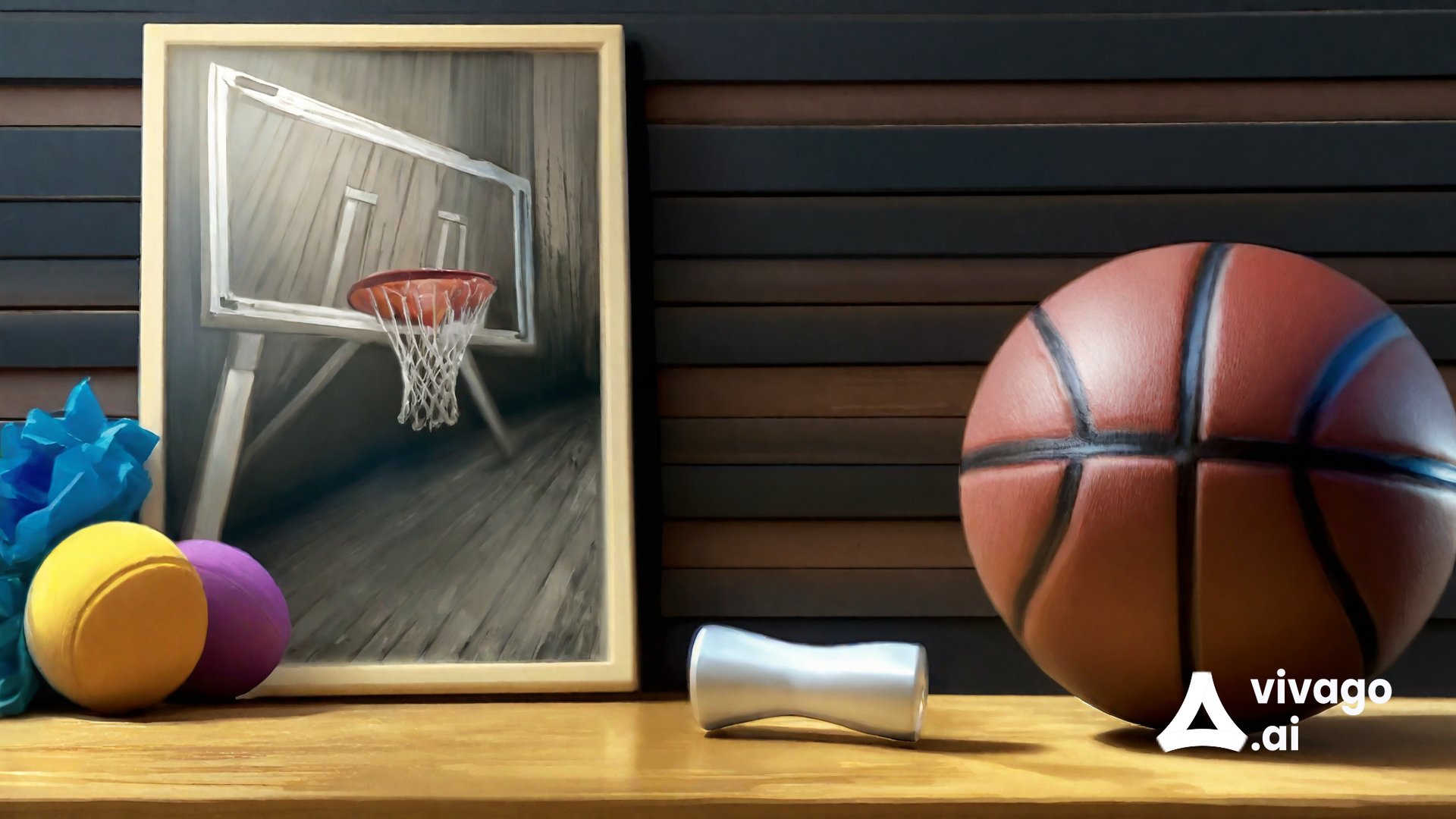
Germany 1993
"An upset for the ages"
RETROTEAMS
Antreas Tsemperlidis
3/11/20257 min read
In the 20th century, no one would call Germany or post-World War II the successor Eastern – Western German states, powerhouses of European basketball, even though the sport had been introduced to the then-German Empire as early as 1896 by August Hermann, a Physical Education professor in Braunschweig. The sport was developing very slowly, with little public interest, and the Empire's involvement in World War I further delayed basketball's establishment in Germany. When Hitler rose to power, he sought to use sports as a showcase of Aryan superiority, funding the creation of clubs led by Germans who had experienced the sport in the US. The German national team participated in the 1936 Berlin Olympics, finishing 17th out of 21 teams. After this failure, state funding was significantly reduced, as resources were redirected toward war materials, and humanity not having learned from the 1914 experience, was heading toward another bloody conflict....
After World War II, with the country’s division into American and Soviet spheres of influence, each new state absorbed the basketball influence of its protector. In West Germany, the sport emerged from American bases and in 1951 the Harlem Globetrotters visited Berlin, playing an exhibition game in front of 75,000 spectators! That same year, despite not having a national league (the Bundesliga for basketball was founded in 1964), West Germany's national team participated in the European Championship games which took place in France, finishing 12th, a position they would regularly occupy in subsequent tournaments (1951, 1953, 1955, 1957, 1961, 1965, 1971, 1981) until the arrival of coach Ralph Klein in Berlin in 1983. In East Germany on the other hand, under Soviet supervision, basketball enjoyed the benefits of the communist regime tending to sports as a platform to simultaneously promote socialist ideals. However, like their western counterparts, the East Germans did not excel, despite a 6th place finish at the 1963 European Championship games in Poland and their presence in the tournaments of 1959, 1961,1965, 1967. In 1969, the East German government decided instead to focus resources on sports that brought international success and medals. Basketball however, was not one of them, the federation prohibited Eastern German teams’ players from going abroad and eventually the federation itself ceased operations in 1973, although it oddly remained a member of FIBA until 1990.
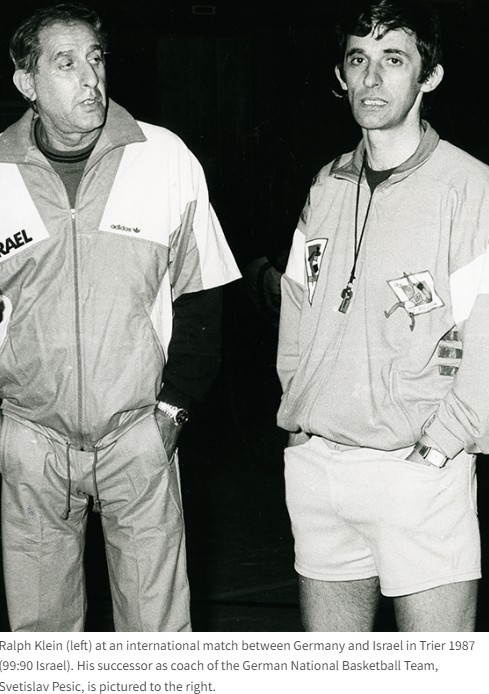

A cycle had already been completed but a more exciting one was just about to begin. The West German Federation was entering the market in search of a new national team coach, with its sights set on the European Championship of 1993. They were, of course, unaware of the monumental changes that would take place on the Old Continent over the coming years. Their choice was to turn to the top coaching school in Europe, to the man who had just been crowned World Junior Champion with Yugoslavia in Bormio, Italy, no other than the legendary Svetislav Pešić.
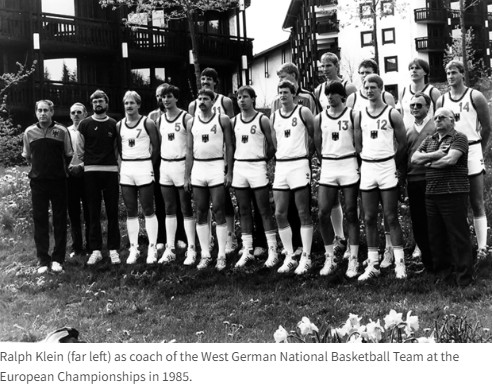

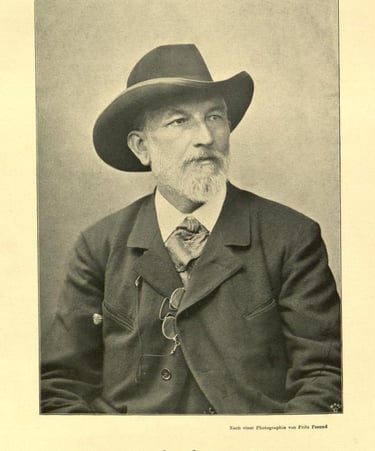

By 1983, with the European Championship in France concluded, West Germany, featuring Detlef Schrempf, finished 8th, while Israel, coached by European Champion Ralph Klein, finished two places higher. Klein, who had survived Auschwitz and moved to Israel in 1951, shocked the basketball world by announcing his return to Germany to coach Saturn Cologne and the national team. He built the team around Schrempf's versatile play, achieving notable success, including qualification for the 1984 Los Angeles Olympics, a 5th place finish in the 1985 European Championship in Stuttgart, and a first-ever World Championship qualification in 1986 in Spain, though they did not make the final twelve. Without Schrempf and the towering Uwe Blab, who were making their living as members of the Mavericks, Klein would rely on the deadly left hand of Michael Jackel and the heights of Hansi Gnad, Christian Welp, and Günther Benke to lead West Germany to 6th place in EuroBasket 1987 and would soon after retire from the bench following an absolutely successful tenure.
Pešić, waited in vain by the phone for the call that would confirm the rumours favouring him as the next coach of the Plavi men's basketball team and answering another call, that of destiny, accepted the offer from the West Germans. The journey to Munich was not easy at all. Knowing he couldn’t count on Schrempf, "Kari" rejuvenated the national team, upgrading young players like Michael Koch, Henning Harnisch, and Stefan Beck, while bestowing the leadership mantle on Welp. This renewal did come at the cost of missing out on notable tournaments, as the Nationalmannschaft missed the train for Seoul in 1988 and the European Championships of '89 and '91. However, "Kari" kept working, and in 1992, with Detlef added back to in his arsenal, he secured a ticket for the Olympic Games via the pre-Olympic tournament of Murcia, surprisingly beating Greece on the way, and leading the now reunited Germany to the quarterfinals in Barcelona.
We now reach the summer of 1993, and the first EuroBasket without the Soviet Union and Yugoslavia, historic countries swept by the winds of history and civil war that irrevocably set them onto the path of oblivion. As symbolic representatives of the two former superpowers the following teams took the courts in Germany; Croatia without Dražen, who was forever asleep in Mirogoj, Slovenia under Zdovc, Bosnia-Herzegovina's "children of war," while the Serbs had been excluded from all international competitions. The Russians and their Baltic neighbours, Estonia and Latvia were also present, though not the bronze Olympic medallist Lithuania, who suffered a shocking elimination by Belarus in the Wroclaw qualifiers. There was no clear favourite for the trophy, with all participants dreaming of the top step, including Greece, Spain, and Italy. Despite the lack of a clear-cut favourite, no one was betting on the Germans, especially after their opening game loss of 103-113 to Estonia, which saw the “Blondy” Aivar Kuusma scoring a stunning 30 points. Following the blow, Pešić realized that high-scoring games didn’t favour his team, tightened the defense (not allowing more than 77 points in any of the subsequent games), and comfortably defeated Belgium and Slovenia to progress to the second round. Against France, the threat of elimination loomed, becoming a full-blown alarm after the loss to Croatia. But "Kari" knew that if they beat Turkey, they’d make it to the quarterfinals, where anything could happen in a knockout game. His players did their duty, advancing to Munich to face the top team from the other group, Spain, featuring Jordi Villacampa and Alberto Herreros. The dramatic game went to overtime, with Germany winning after Christian Welp's shot with 2 seconds left, following two missed 1+1 free throws by Azofra. For the first time in their history, the Germans reached the semifinals, where they would face the Greek national team, which had also achieved a dramatic victory against France, thanks to a basket by Fasoulas. Greece’s best chance to reach the final again turned to be unsuccesfull. The Germans dominated the air with their tall players, while Welp, following Pešić’s instructions, moved out of the paint to shoot from the five meter mid-range area, where Fasoulas couldn’t follow him. In defence, "Kari" kept rotating players to wear him out (Gnad, Benke, and Welp were heavier bodies), and Koch did an excellent job on Giannakis. Despite the great 23-point performance by Fanis Christodoulou, Greece was defeated 76-73.
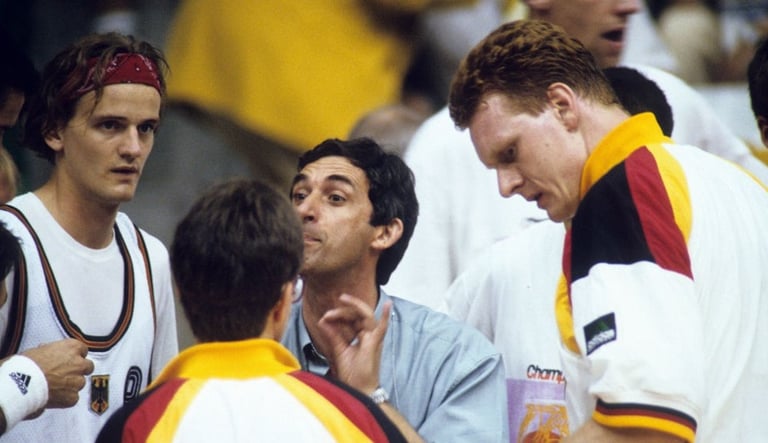

Munich and the Olympiahalle hosted the final between two debutants, as the Russians, who had dispatched the Croats in the other semifinal, were also eying for the trophy for the first time as an independent nation. The game was tight, with the Russians leading by three points at halftime, relying on perimeter shots from Babkov and Bazarevich. The Germans, as usual, relied on Welp, while Harnisch and Koch contributed their points, and the unexpected hero emerged in the form of "little" Kai Nürnberger, who scored 14 crucial points while perfectly orchestrating the game. The Alba Berlin’s point guard greatest feat, however, was still to come. In decisive way, with 10 seconds left and Babkov having made 1+1 free throws to put Yuri Selikhov’s team up 70-68, Nürnberger dribbled down the court, guarded by Bazarevich. As Mikhail Mikhailov leaped to block what he thought would be a shot, Nürnberger passed to Welp, who dunked the ball, also drawing a foul from the Russian center with 3 just seconds remaining. The German big man, Christian stepped to the free-throw line, bearing the weight of an entire nation on his shoulders and amassing the necessary composure, made the shot to secure the 71-70 lead and victory. In the dying moments of the time left, Vladimir Gorin tried to emulate the hero of ’72, Alexander Belov, with a near-half-court shot for the win, but to no avail.
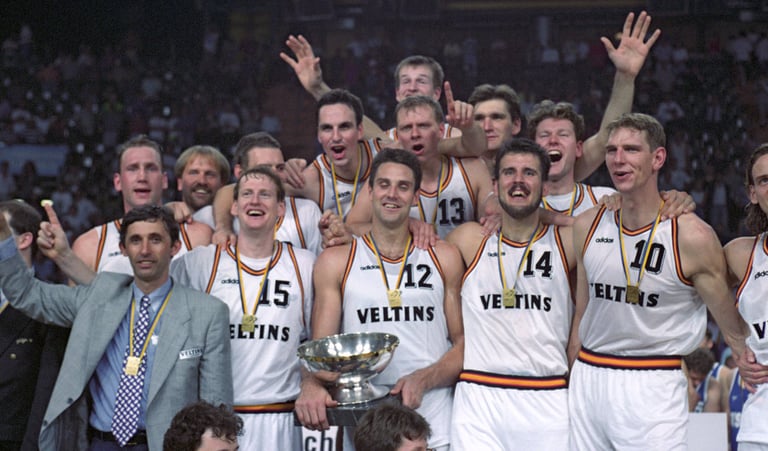

Germany was the new European champion in a surprise akin to Greece’s triumph six years earlier. However, had the Soviets and Yugoslavs been present, it would have been much harder for the Germans to achieve this feat. Exploiting their home advantage and the unprecedented upheavals on the continent in the preceding years, Pešić’s players etched their names in gold in the annals of the sport, and "Kari" felt fully vindicated for accepting the offer, finally holding the trophy that perhaps eluded him in 1989.
Once again, Munich and the Olympiahalle proved to be venues of great surprises. EuroBasket stories...


